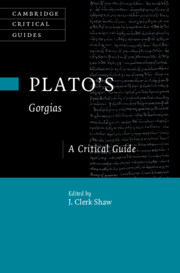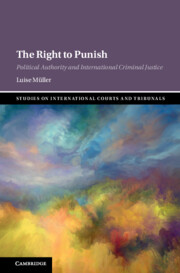526 results
5 - Electra
-
- Book:
- Helping Friends and Harming Enemies
- Print publication:
- 13 June 2024, pp 149-183
-
- Chapter
- Export citation
Chapter 4 - Socrates and Coherent Desire (Gorgias 466a–468e)
-
-
- Book:
- Plato's Gorgias
- Published online:
- 25 May 2024
- Print publication:
- 30 May 2024, pp 68-86
-
- Chapter
- Export citation
Chapter 8 - Cooperation and the Search for Truth
-
-
- Book:
- Plato's Gorgias
- Published online:
- 25 May 2024
- Print publication:
- 30 May 2024, pp 146-171
-
- Chapter
- Export citation

Plato's Gorgias
- A Critical Guide
-
- Published online:
- 25 May 2024
- Print publication:
- 30 May 2024
5 - Fairness, Equality, and Democratic Authority
-
- Book:
- The Right to Punish
- Published online:
- 16 May 2024
- Print publication:
- 23 May 2024, pp 109-155
-
- Chapter
- Export citation
Critical Forum: Populism, Hybrid Democracy, and Youth Cultures
-
- Journal:
- Critical Pakistan Studies ,
- Published online by Cambridge University Press:
- 20 May 2024, pp. 1-31
-
- Article
-
- You have access
- Open access
- HTML
- Export citation

The Right to Punish
- Political Authority and International Criminal Justice
-
- Published online:
- 16 May 2024
- Print publication:
- 23 May 2024
Unjust equal relations
-
- Journal:
- Economics & Philosophy , First View
- Published online by Cambridge University Press:
- 14 May 2024, pp. 1-21
-
- Article
-
- You have access
- Open access
- HTML
- Export citation
Learning from failure in ‘an Integral Part’ of EU Law: interpretation of international treaties in the CJEU
-
- Journal:
- European Law Open ,
- Published online by Cambridge University Press:
- 22 April 2024, pp. 1-43
-
- Article
-
- You have access
- Open access
- HTML
- Export citation
Chapter 4 - The Theology of the Book of Zephaniah
-
- Book:
- The Theology of the Books of Nahum, Habakkuk, and Zephaniah
- Published online:
- 28 March 2024
- Print publication:
- 04 April 2024, pp 173-238
-
- Chapter
- Export citation
Chapter 7 - Conclusion
-
- Book:
- Epicurean Justice
- Published online:
- 07 March 2024
- Print publication:
- 14 March 2024, pp 161-164
-
- Chapter
- Export citation
Chapter 2 - Contractual Justice
-
- Book:
- Epicurean Justice
- Published online:
- 07 March 2024
- Print publication:
- 14 March 2024, pp 49-79
-
- Chapter
- Export citation
Introduction
-
- Book:
- Epicurean Justice
- Published online:
- 07 March 2024
- Print publication:
- 14 March 2024, pp 1-13
-
- Chapter
- Export citation
Chapter 5 - Justice and Law
-
- Book:
- Epicurean Justice
- Published online:
- 07 March 2024
- Print publication:
- 14 March 2024, pp 118-127
-
- Chapter
- Export citation
Chapter 2 - Relativism, King of All
-
- Book:
- Herodotus and the Presocratics
- Published online:
- 07 March 2024
- Print publication:
- 14 March 2024, pp 38-91
-
- Chapter
- Export citation
Chapter 4 - Moral Psychology
-
- Book:
- Epicurean Justice
- Published online:
- 07 March 2024
- Print publication:
- 14 March 2024, pp 98-117
-
- Chapter
- Export citation
15 - Why Educate?
- from Part II - Ethics and Education in Practice
-
-
- Book:
- The Cambridge Handbook of Ethics and Education
- Published online:
- 07 March 2024
- Print publication:
- 14 March 2024, pp 305-329
-
- Chapter
- Export citation
21 - Educating All Children
- from Part II - Ethics and Education in Practice
-
-
- Book:
- The Cambridge Handbook of Ethics and Education
- Published online:
- 07 March 2024
- Print publication:
- 14 March 2024, pp 443-464
-
- Chapter
- Export citation
Chapter 3 - Aretaic Justice
-
- Book:
- Epicurean Justice
- Published online:
- 07 March 2024
- Print publication:
- 14 March 2024, pp 80-97
-
- Chapter
- Export citation
Chapter 6 - Ethical Naturalism
-
- Book:
- Epicurean Justice
- Published online:
- 07 March 2024
- Print publication:
- 14 March 2024, pp 128-160
-
- Chapter
- Export citation



